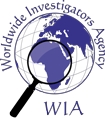“The private investigator has a mission of information, counseling, assistance and investigation on behalf of his clients, individuals or companies. They may have a specialty (financial investigations, insurance fraud investigations, trademark counterfeiting investigations, moral investigations, etc.) or be generalists. »
The detective is a private investigator, i.e. a person who carries out professional research, investigations and surveillance. This status of private law investigator (which is not a name or title but a legal and social status) is shared with various other professions that have no relationship with private investigators, particularly in administrative, civil, criminal and social proceedings.
Detective, Private Investigator, Private Investigator, Private Investigator, Private Research and Intelligence Officer, etc. are different names.
Once specialized in morality cases (adultery, divorce), the private law investigator now devotes most of his time to detecting fraud of all kinds, exposing fraud or breach of trust, detecting unfair competition or fighting industrial espionage.
The search for missing persons is still a topical issue in the profession.
Banks, insurance companies, collection agencies and bailiffs are its main customers. The Investigator under private law carries out upstream actions of the police or gendarmerie. He may be an employee of an agency or work independently or seek a specific assignment with agencies to whom he offers his services.
A private investigator may accept or refuse an assignment without being obliged to justify himself. At the end of each assignment, he or she prepares a detailed and detailed report. This document is admissible in court before all courts and tribunals as evidence.
By providing validated new evidence, the detective’s counter-investigations can help to change (on appeal, for example) the conclusions of a case that has been or is about to be judged.
To be a detective you must have a university degree, be trained in a school, or work as an assistant in a firm for at least five years to acquire knowledge in the field. No recognized training school exists in Cameroon, but private investigation firms accept trainees and can issue you a certificate of training certificate after a period of at least two years.
However, many private schools exist in Europe and in the USA and Canada or many detectives currently working in Cameroon have been trained.
To become a private investigator in Europe, mainly in France,
You must obtain one of the following titles and diplomas
– CQP of detective employee
– Certified detective, private research officer-operations directorate (BAC+2 level required) to become branch manager, freelance collaborator, employee investigator. Essential title to exercise the liberal activity of detective.
These diplomas are accredited and registered in the RNCP. They are proposed by ESARP or IFAR.
Since 1998, the University of PANTHON ASAS Paris II has been providing professional training as a private investigator and as a director of private investigations.
There are many private schools in Europe and the USA; however, their choice is not unanimous and should be made with great care. There are also correspondence schools, training centers, trade union schools.
To find out more about these schools and training courses, click on this link: https://detective-prive.info/devenir-enqueteur-prive-en-fiches-pratiques/

